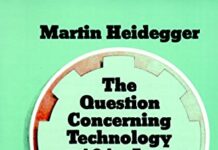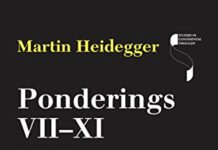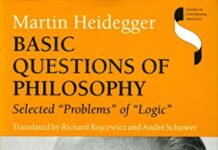
Ebook Info
- Published: 2008
- Number of pages: 152 pages
- Format: PDF
- File Size: 8.73 MB
- Authors: Martin Heidegger
Description
First published in 1988 as volume 63 of his Collected Works, Ontology―The Hermeneutics of Facticity is the text of Heidegger’s lecture course at the University of Freiburg during the summer of 1923. In these lectures, Heidegger reviews and makes critical appropriations of the hermeneutic tradition from Plato, Aristotle, and Augustine to Schleiermacher and Dilthey in order to reformulate the question of being on the basis of facticity and the everyday world. Specific themes deal with the history of ontology, the development of phenomenology and its relation to Hegelian dialectic, traditional theological and philosophical concepts of man, the present situation of philosophy, and the influences of Aristotle, Luther, Kierkegaard, and Husserl on Heidegger’s thinking. Students of Heidegger will find initial breakthroughs in his unique elaboration of the meaning of human experience and the “question of being,” which received mature expression in Being and Time.
User’s Reviews
Editorial Reviews: Review “With thematic trajectories pointing both toward and beyond Being and Time, this translation . . . is of enormous significance for students of the development of Heidegger’s early thought.”―Daniel O. Dahlstrom, Boston University”John van Buren’s translation should be read by anyone looking for an access point into Heidegger’s work because of his faithful and comprehensible way of rendering this difficult text. Any careful reader of Heidegger who is looking to better understand his work should also read this translation if for no other reason than to see, in nuce, the beginnings of Heidegger’s thought. Basically, anyone reading Heidegger should be reading this text.Volume 15 Issue 7 2010″―European Legacy”With thematic trajectories pointing both toward and beyond Being and Time, this translation . . . is of enormous significance for students of the development of Heidegger’s early thought.”―Daniel O. Dahlstrom, Boston University Review With thematic trajectories pointing both toward and beyond Being and Time, this translation . . . is of enormous significance for students of the development of Heidegger’s early thought. — Daniel O. Dahlstrom ― Boston University About the Author John van Buren is Professor of Philosophy at Fordham University. He is author of The Young Heidegger: Rumor of the Hidden King (IUP, 1994). Excerpt. © Reprinted by permission. All rights reserved. Ontology—The Hermeneutics of FacticityBy Martin Heidegger, John van BurenIndiana University PressCopyright © 1999 Indiana University PressAll rights reserved.ISBN: 978-0-253-22021-9ContentsIntroduction, §1. The title “Ontology”, 1, THE HERMENEUTICS OF FACTICITY, Foreword, 4, PART ONE PATHS OF INTERPRETING THE BEING-THERE OF DASEIN IN THE A WHILENESS OF TEMPORAL PARTICULARITY, 5, Chapter One Hermeneutics, 6, Chapter Two The Idea of Facticity and the Concept of “Man”, 17, Chapter Three Being-Interpreted in Today’s Today, 28, Chapter Four Analysis of Each Interpretation Regarding Its Mode of Being-Related to this Object, 40, PART TWO THE PHENOMENOLOGICAL PATH OF THE HERMENEUTICS OF FACTICITY, Chapter One Preliminary Reflections: Phenomenon and Phenomenology, 53, Chapter Two “The Being-There of Dasein Is Being in a World”, 61, Chapter Three The Development of the Forehaving, 65, Chapter Four Significance as the Character of the World’s Being-Encountered, 71, Appendix: Inserts and Supplements, 81, Editor’s Epilogue by Kate Brocker-Oltmanns, 88, Translator’s Epilogue, 91, Endnotes on the Translation, 101, Glossary, German-English, 127, English-German, 132, INTRODUCTION§1. The title “Ontology”As comments on the first indication of the theme of facticity. Initial description: ontology.”Ontology” means doctrine of being. If we hear in this term only the indefinite and vague directive that, in the following, being should in some thematic way come to be investigated and come to language, then the word has performed its possible service as the title of the course. However, if ontology is regarded as designating a discipline, one belonging, for instance, within the field of inquiry of Neo-Scholasticism or within that of phenomenological Scholasticism and the directions of academic philosophy influenced by it, then the word “ontology” is not as a course title fitting for what our theme and manner of treating it will be in the following.If on top of that one takes “ontology” to be a rallying motto for the now popular attacks on Kant and, more precisely, on the spirit of Luther and, in principle, on all open questioning not frightened in advance by possible consequences—in short, ontology as the alluring call to a slave revolt against philosophy as such—then the title of this course is completely misleading.The terms “ontology” and “ontological” will be used only in the abovementioned empty sense of nonbinding indications. They refer to a questioning and defining which is directed to being as such. Which sort of being [Sein] is to be questioned after and defined and how this is to be done remain utterly indefinite.In preserving a memory of the Greek word ov [being], “ontology” at the same time means that epigonic treatment of traditional questions about being which proliferates on the soil of classical Greek philosophy. Though traditional ontology claims to deal with general definitions of being, it actually has a definite region of being before its eyes.In its modern usage, the word “ontology” means as much as “theory of objects” and indeed one which is in the first place formal. In this respect, it coincides with ancient ontology (“metaphysics”).However, modern ontology is not an isolated discipline, but rather is connected in a peculiar manner with what is understood by phenomenology in a narrow sense. It was in phenomenology that a fitting concept of research first emerged. Ontology of nature, ontology of culture, material ontologies—they form the disciplines in which the content of the objects in these regions is drawn out as subject matter and displayed in its catégorial character. What is thus made available then serves as a guide for problems of constitution,, the structural and genetic contexts of consciousness of objects of this or that kind.Conversely, it is only through phenomenology that the ontology corresponding to it is established on a secure basis and held on an orderly course in its treatment of problems. When we look at consciousness of …, the of-which, i.e., the character of a being as such insofar as it is an object, also becomes visible, and it is only in this manner that it becomes visible. The characteristics of objects in the respective regions of being are what is at issue in the ontologies. This is what they come to. Precisely not being as such, i.e., be-ing which is free of objects. Phenomenology in the narrow sense as a phenomenology of constitution. Phenomenology in the wide sense as something which includes ontology.In such ontology the question—from which field of being should the decisive meaning of being which is to guide the treatment of all problems in ontology be drawn?—is not at all posed. This question is unknown to it, and because of that its own provenance, the genesis of its meaning, remains closed off to it.The fundamental inadequacy of ontology in the tradition and today is twofold:1. From the very start, its theme is being-an-object, i.e., the objectivity of definite objects, and the object as it is given for an indifferent theoretical mean-ing, or a material being-an-object for the particular sciences of nature and culture concerned with it, and by means of the regions of objects—should the need arise—the world, but not as it is from out of its being-there for Dasein and the possibilities of this being-there, or also affixing other nontheoretical characteristics to it. (Note: double sense of “nature” as world and as region of objects—”nature” as world can be formalized only from out of Dasein, historicity, thus not the “basis” of its temporality—same goes for “body.”)2. What results from this: it blocks access to that being [Seienden] which is decisive within philosophical problems: namely, Dasein, from out of which and for the sake of which, philosophy “is.”Insofar as the title “Ontology” is taken in an empty nonbinding sense, so that it means any questioning and investigating which is directed to being as such, it will indeed come into use in the following. Thus the term “ontological” refers to the posing of questions, explications, concepts, and categories which have arisen from looking at beings as be-ing [Seiendes als Sein] or, alternately, have failed to do this.(Ancient metaphysics is taken up again as “ontology”—superstition and dogmatism without the slightest possibility of, or even mere tendency to, the kind of research which poses questions.)(In “time” it will in fact be pointed out that fundamental problems are also found in ontology!)Thus the course title which has arisen from the basic theme of what follows and the manner of its treatment is rather: The Hermeneutics of Facticity. (Continues…)Excerpted from Ontology—The Hermeneutics of Facticity by Martin Heidegger, John van Buren. Copyright © 1999 Indiana University Press. Excerpted by permission of Indiana University Press. All rights reserved. No part of this excerpt may be reproduced or reprinted without permission in writing from the publisher.Excerpts are provided by Dial-A-Book Inc. solely for the personal use of visitors to this web site. Read more
Reviews from Amazon users which were colected at the time this book was published on the website:
⭐This is a lecture course by Heidegger from 1923, 4 years before the publication of Being and Time, and it provides an earlier glimpse of some of the central themes of that book. The text was put together from Heidegger’s own notes, augmented by those of others attending the lectures.One of the critical themes previewed here is Heidegger’s claim that the disclosure of things such as tables in an interconnected web of significance is prior, both in experience and in ontological order, to disclosures of those things as “objects” or “mere things.” On pages 68-69 here, he makes a strong contrast between the table in his home, as a table for writing, sewing, or eating — disclosed to us in a structure of such “in-order-to” relations, with the same table as “mere thing.” The example mirrors his example of the hammer in Being and Time, but in more personal terms because the table he describes is one in his own house, used by himself, his own wife, and his children. I think the example comes across as more authentic and less abstract than the hammer, which reads in Being and Time, to me anyway, as an imagined rather than lived example.That the table as “mere thing” is a construct, founded on the basis of the table as part of a web of significance, goes to the heart of Heidegger’s early philosophy and to his reversal of the traditional search for a metaphysics of pure objectivity, one accounting for objects from no point of view, without interpretation. For Heidegger, the “question of being” is never one asked by no one, to be answered by an account of objects as disclosed to no one, but one that is necessarily asked by us (“Dasein”). Thus, we and the way in which the world is disclosed to us are unavoidable at the start of our investigation. That world, he claims, is the world characterized by “care” and through relations of significance — the “in order to” of those things (e.g., tables) disclosed to us.Reading this book won’t take the place of reading the much longer, fuller account provided in Being and Time. In fact, if you started by reading only this book, I would think it would spur you on to want to read Being and Time to fill out the compressed insights and accounts given here. What remains distinctive is a freshness of insight and, sometimes, a less restrained and less formal critique of the state of philosophy in Heidegger’s time.
⭐This book it’s a short introduction to a new way of thinking the being. Heidegger resurrects Saint Thomas philosophy of existence as the essence of men and start to construct the facticity.Is not easy to understand facticity, I’m a bit sure that Heidegger later didn’t use any more that word, he later found a better way to talk about the being in the world of the being there.The radical approach that looks for the pristine way of thinking of the Greeks that Husserl first attempt in his Logical Investigations, Heidegger starts away from this standpoint and looks beyond, but with and advantage over Husserl: a solid foundation on history and really astonish knowledge is the medieval philosophy.This books is a great guideline on how a philosopher arrives to his thoughts, obviously Heidegger doesn’t reveal all his cards but it’s really impressive the way that his philosophy takes.
⭐Anyone who has been caught up with ‘Being and Time’ will have to add this to his or her reading list: it takes being-in-the-world to a deeper level.
⭐A good introdugtion to Heideggerian thought before Being and Time. Its also an explicit investigation on the grounds of a phenomenological aproach to the hermeneutical comprehensing of the Dasein.
⭐very helpful introduction to “Being and Time”
⭐Helpful for getting into B&T
⭐Excelente
⭐This book is thoroughly worthless. It will add absolutely nothing to your knowledge of Heidegger. It does not clarify Being and Time one bit. Do not waste your money on it. On the other hand, the History of the Concept of Time lecture is very worthwile; buy it instead: it will teach you something about Husserlian phenomenology qua categorial intuition, the apriori, and intentionality, and by reading between the lines you can get a sense of how Heidegger diverges. But with the book in question, you won’t even learn anything about hermeneutics or about facticity. Instead you’ll get a whole lot of talk about Spengler. NOT worth more than $5!!
⭐The Early Heidegger at his most clear. Anyone wanting to understand an earlier stage of the thinker’s arguments in Being and Time would do well to give this a go.
⭐This review does not address the content of Heidegger’s lecture or reasons for buying into it but a printing error. The rating reflects concern about the printing and not about Heidegger’s thoughts.The first page of the first chapter (on Hermeneutics) is missing the last two words or so of each row. Did not expect such an oversight from Indiana University Press. I am not going to return the book simply because I need it at the moment.
⭐This book is essential for anyone researching Heidegger’s philosophy. If you are already familiar with Heidegger (especially Being and Time), then this book will amaze you. It is clear, concise and very profound. He deals with so much material in such a short text and you will simply fly through the pages. Absolutely outstanding!
⭐Very happy with this seller! Quality product, and delivered on time! Thank you so much!
Keywords
Free Download Ontology―The Hermeneutics of Facticity (Studies in Continental Thought) in PDF format
Ontology―The Hermeneutics of Facticity (Studies in Continental Thought) PDF Free Download
Download Ontology―The Hermeneutics of Facticity (Studies in Continental Thought) 2008 PDF Free
Ontology―The Hermeneutics of Facticity (Studies in Continental Thought) 2008 PDF Free Download
Download Ontology―The Hermeneutics of Facticity (Studies in Continental Thought) PDF
Free Download Ebook Ontology―The Hermeneutics of Facticity (Studies in Continental Thought)




